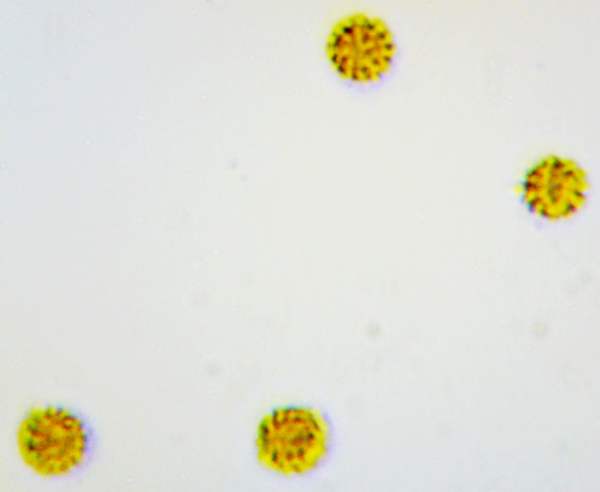Geastrum fimbriatum Fr. - Sessile Earthstar
Phylum: Basidiomycota - Class: Agaricomycetes - Order: Geastrales - Family: Geastraceae
Distribution - Taxonomic History - Etymology - Identification - Culinary Notes - Reference Sources
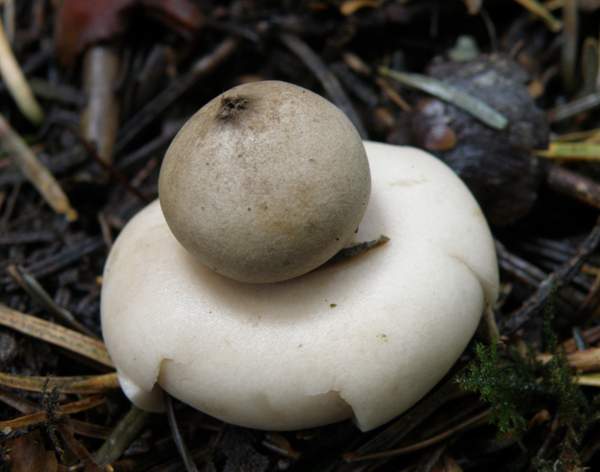
Initially looking like a round stone lying partly buried in the soil, the outer skin splits into rays that fold back neatly beneath the inner spore sac, raising it up from the ground.
Sessile Earthstars fruit in small groups and occasionally in fairy rings, usually on alkaline soil; they seem to have no particular preference for either hardwood trees or conifers.
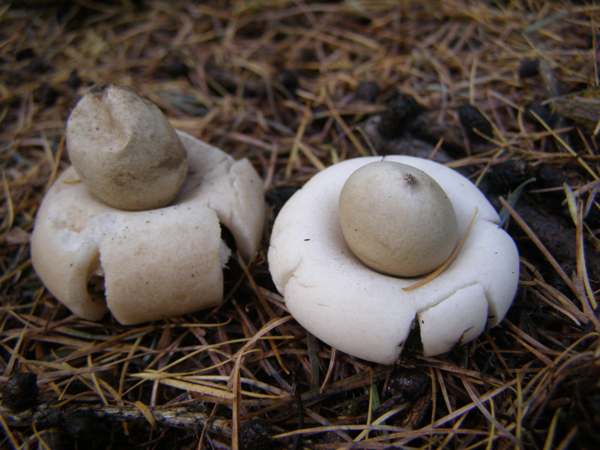
Distribution
The Sessile Earthstar is one of the most common and widespread of more than 15 earthstar species known to occur in Britain. Throughout most of England, Wales, Scotland and Ireland it is still only an occasional find, but there are parts of southern England where this earthstar is fairly common. Geastrum sessile is more common in France and many other countries in mainland Europe, particularly in the Mediterranean region.
Taxonomic history
The species was described in 1829 by the great Swedish mycologist Elias Magnus Fries, who established its basionym when he gave it the binomial name Geastrum fimbriatum. The species had been recognised much earlier, of course - for example in 1801 Christiaan Hendrik Persoon had described this earthstar under an invalid (already used) specific epithet.
Synonyms of Geastrum fimbriatum include Geastrum rufescens var. minor Pers., Lycoperdon sessile Sowerby, Geastrum tunicatum Vittad., and Geastrum sessile (Sowerby) Pouzar.
Etymology
Geastrum, the generic name, comes from Geo- meaning earth, and -astrum meaning a star, and so literally Geastrum means earth star. The specific epithet fimbriatum is Latin and means fibrous or fringed - a reference to the fringed opening of the peristome (spore sac); the English word fimbriate is also used to indicate how the ends of a flower petal such as a pink (of the family Caryophyllaceae) are split into two or more divisions. The synonymous specific epithet sessile by which this earthstar was until recently more commonly known means sessile (the Latin and English spellings being identical), in other words sitting down.
Identification guide
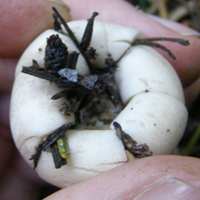 |
Fruitbody5 to 9 creamy-white outer rays are recurved beneath the unstalked papery grey spore sac, which is finely downy. The outer diameter (across the rays) is 2.5 to 5cm.
|
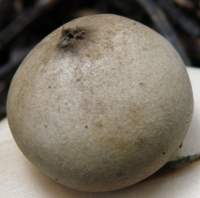 |
Spore sacSubspherical (an oblate spheroid), the spore sac is 1 to 2.2cm in diameter, ochraceous-cream, becoming greyer with age. The apical pore is fibrous but not striate. |
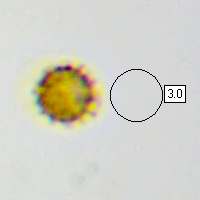 |
SporesGlobose, minutely warty, 2.9-3.5µm in diameter (excluding the warts).
Spore massBrown. |
Odour/taste |
Not significant. |
Habitat & Ecological role |
Mainly found in leaf-litter-rich soil in deciduous and mixed woodland, often on chalk-rich soil. |
Season |
Fruiting in the autumn; long lasting, and sometimes remaining intact through the winter months. |
Similar species |
Several other Geastrum species are of the same general form, and confident identification requires experience. In particular not all Collared Earthstars, Geastrum triplex, split to form a distinct collar, and unsplit specimens can be confused with the Sessile Earthstar. |
Culinary Notes
In common with other earthstars, this is an inedible fungus and of no culinary value. When dried, earthstars can make attractive table decorations as long as they do not get mistaken for pepper shakers!.
Reference Sources
Fascinated by Fungi, 2nd Edition, Pat O'Reilly 2016, reprinted by Coch-y-bonddu Books in 2022.
Pegler, D.N., Laessoe, T. & Spooner, B.M (1995). British Puffballs, Earthstars and Stinkhorns. Royal Botanic Gardens, Kew.
Dictionary of the Fungi; Paul M. Kirk, Paul F. Cannon, David W. Minter and J. A. Stalpers; CABI, 2008
Taxonomic history and synonym information on these pages is drawn from many sources but in particular from the British Mycological Society's GB Checklist of Fungi.
Fascinated by Fungi. Back by popular demand, Pat O'Reilly's best-selling 450-page hardback book is available now. The latest second edition was republished with a sparkling new cover design in September 2022 by Coch-y-Bonddu Books. Full details and copies are available from the publisher's online bookshop...

